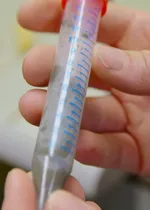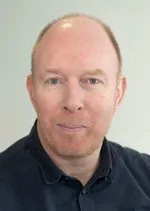Departmental news
Digging for Britain - DNA testing
 On 5 January Professor Robin Allaby featured in the BBC's Digging for Britain programme. He discussed the DNA testing of sediment from a Mesolithic settlement located on the seabed of the Solent. The analysis determined what was being eaten by the Mesolithic people. The appearance of wheat, 2000 years earlier than previously accepted was a major revelation.
On 5 January Professor Robin Allaby featured in the BBC's Digging for Britain programme. He discussed the DNA testing of sediment from a Mesolithic settlement located on the seabed of the Solent. The analysis determined what was being eaten by the Mesolithic people. The appearance of wheat, 2000 years earlier than previously accepted was a major revelation.
Watch on iPlayer (from 46:10)
COP26 – reflections on attending as an Observer from Warwick
 Professor Hendrik Schafer shares his reflections on attending COP26:
Professor Hendrik Schafer shares his reflections on attending COP26:
"When I was asked whether I’d want to be part of the delegation that the University sends to COP26 in Glasgow, I did not have to think about it for long, after all, Climate Change is the biggest challenge that we are facing as global human society. Although I only spent two days at COP, I look back at this as a positive and worthwhile activity.
Despite disappointment about the watered-down COP26 declaration, I think that COP26 has brought some progress overall. There is an increased sense of urgency and political will to start tackling the issue, and although I personally think that we need much faster and more ambitious action, any progress is welcome and significant. Annual submissions of national action plans will hopefully lead to increasing pressure on countries to accelerate action rather than delaying it, but the acid test will be whether actions will lead to a slowdown in greenhouse-gas emissions over the next few years.
Another important milestone is that protection and regeneration of natural ecosystems such as forests, mangroves, saltmarshes and seagrass meadows is finally recognised by COP as an important part of the strategy to combat climate change. Those coastal marine ecosystems, which are referred to as ‘blue carbon’ environments are incredibly effective carbon sinks, whose protection will not only ensure a contribution to carbon sequestration but enhance biodiversity and deliver a raft of positive ecosystem services. Nevertheless, there is a need to understand in more detail, how these ecosystems will respond to climate change and to monitor their actual C sequestration. These are research activities that we are in a good position to contribute to with several groups studying relevant environmental processes and trace gases. Another area that is getting more attention is the carbon footprint of agriculture, again an area where we have critical expertise and where SLS researchers can make contributions to the research agenda.
Whilst those are important areas where a more detailed scientific understanding is required, the basic science background of climate change has been clear for too long, with no sense of urgency and too little action. The key question is how we get society to make the changes that are required. I believe that creating a dialogue between citizens, scientists, business, and government at various levels will be vital for driving positive changes. There have been excellent examples at COP26 that illustrate the critical role of positive communication and citizen involvement and how these can lead to the creation of action plans at local and regional level with positive outcomes for local communities. It needs a few success stories that deliver positive change in quality of life and sustainability, which will hopefully increase the roll out of programmes for mitigation and adaptation measures, especially if there is a demand and acceptance from the public for positive action. The University is already looking at opportunities to engage with local community and governments to enhance sustainability in the region.
There is huge potential across the university to be a centre for climate action, going well beyond the research on innovation in the automotive sector, but also in the humanities, arts, economics, and of course Life Sciences."
Professor Hendrik Schaefer is part of expert delegation attending COP26
 Environmental microbiologist Professor Hendrik Schaefer is one of 17 University of Warwick delegates taking their expertise to COP26. The university is one of a limited number of institutions to have been granted official observer status by the UN-led conference, which is being hosted by the UK.
Environmental microbiologist Professor Hendrik Schaefer is one of 17 University of Warwick delegates taking their expertise to COP26. The university is one of a limited number of institutions to have been granted official observer status by the UN-led conference, which is being hosted by the UK.
Press release (20 October 2021)
Warwick COP26 researchers and academic experts attending announced (28 October 2021)
